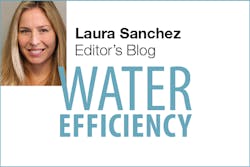Water delivery systems leak. Therefore, non-revenue water is an issue concerning all water delivery systems—not only because water lost represents dollars lost, but because it also means the waste of a precious resource.
According to a study by the World Bank, “The total cost to water utilities caused by non-revenue water worldwide can be conservatively estimated at $141 billion per year, with a third of it occurring in the developing world.” Industry estimates put typical system leakage at about 10%. However in developing countries, the report estimates that about 45 million cubic meters are lost from distribution networks daily.
A new state law will soon require California water utilities to begin reporting losses in their distribution systems. Senate Bill 555, a law passed by the state legislature in 2015 and now under public review, requires utilities treating more than 3,000 acre-feet of water annually or with 3,000 connections to file validated water loss audits. The audit requirement will affect 410 utilities beginning in October 2017.
While the required reporting seems a positive stride toward improving utility management practices and system efficiencies, it will most likely involve a significant amount of work to consolidate and validate data. But beyond conservation, utilities will potentially be able to use the information to help reduce operations costs, detect real water losses, and repair infrastructure before it becomes problematic.
“You conduct a water loss audit to get an estimate of where the water is going and how much is being lost as a result of either meter errors, water theft, or actual leaks in the system,” Todd Thompson, a senior engineer at the California Department of Water Resources told Water Deeply. “The water loss audit is the first step in making that determination. It’s important in California, as it is everywhere, to make sure we use our resources as wisely as possible and as efficiently as possible. Water loss auditing is a step in that direction.”
According to Thompson, most utilities have the data on hand. Consolidating and validating that data will simply mean a bit more work. Is Senate Bill 555 a step in the right direction or over-regulation? What would similar legislation mean for your utility?
